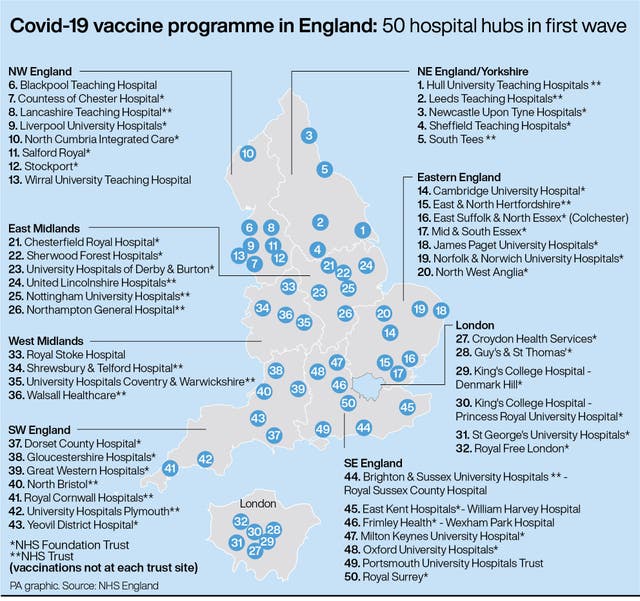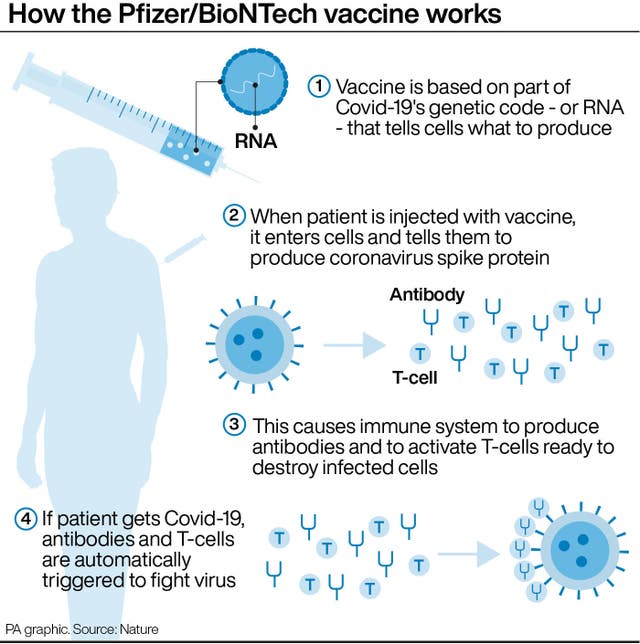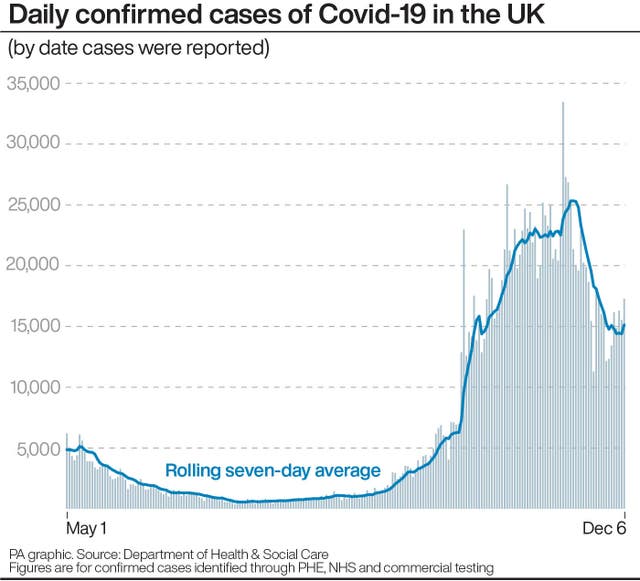V-day to mark ‘decisive turning point’ in battle against Covid-19 – NHS chief
Vaccinations will be administered at dozens of hospital hubs from Tuesday.

The beginning of the vaccination rollout for Covid-19 could mark “a decisive turning point in the battle” against the virus, the chief executive of NHS England has said.
Vaccinations will be administered at dozens of hospital hubs from Tuesday – dubbed “V-Day” by Health Secretary Matt Hancock.
People aged 80 and older, care home workers and NHS workers who are at higher risk are at the front of the queue for the jabs.
Speaking just hours before the vaccine rollout begins, Sir Simon Stevens said: “Tomorrow is the beginning of the biggest vaccination campaign in our history, building on successes from previous campaigns against conditions: diseases like polio, meningitis, and tuberculosis.
“Hospitals, and then GPs and pharmacists as more vaccine becomes available, are going to be vaccinating at least until next spring.
“So in the meantime, we’re going to have to continue to be very careful. But if we do that I think there’s every chance that we will look back on tomorrow as marking a decisive turning point in the battle against coronavirus.”

He said there is “every prospect” that by spring the high-risk vulnerable groups, as identified by the medical experts, will all have been vaccinated.
There are challenges to overcome with vaccinating care home residents despite them being at the top of the priority list, but Sir Simon said he is confident that vaccinations can begin to be offered in care homes “well before Christmas”.
He cautioned that it will take “some weeks and months as vaccine supply becomes available for GPs and hospitals and pharmacists to reach all of the most vulnerable”.
Asked about those who remain sceptical about the new jabs, he said the NHS “has got a great track record” when it comes to vaccinations “right from the start”.

Health Secretary Matt Hancock tweeted: “As we begin rolling-out the first coronavirus vaccine tomorrow across the UK, I want to thank everyone working tirelessly on this. We are not there yet but there is light at the end of the tunnel.”
Croydon University Hospital in south London was one of the first hospitals to take delivery of the vaccine over the weekend, with similar scenes unfolding around the country ahead of the rollout.
The UK has ordered 40 million doses of the Pfizer/BioNTech jab, enough to vaccinate 20 million people because two doses are needed.
There are 800,000 doses in the first tranche, meaning 400,000 people will be vaccinated initially.
Logistical issues mean there are difficulties in delivering the Pfizer jab to care home residents, as it needs to be stored at minus 70C before being thawed out and can only be moved up to four times within that cold chain before being used.
The vaccine boxes containing 975 doses will need to be split so they can be taken in smaller packs to care homes.
The distribution of the vaccine across the UK is being undertaken by Public Health England and the NHS in England, Scotland, Wales and Northern Ireland through systems specially adapted from those used for the national immunisation programmes.
Vaccinations are due to begin in Scotland, Wales and Northern Ireland from Tuesday.
The Scottish Government has received 65,000 doses of the Pfizer jab so far, with more on the way.
In Wales, the first set of vaccines will be available to just under 19,000 people, the country’s Health Minister Vaughan Gething said.
Meanwhile, Northern Ireland has 25,000 doses available in its initial batch of the vaccine.
The UK’s chief medical officers have warned the coronavirus vaccine will only have a “marginal impact” on hospital numbers over the winter.

In a letter to colleagues, the four chief medical officers said this winter would be “especially hard” for the health service due to coronavirus.
GP surgeries in England have also been told to be ready to start staffing GP-led Covid-19 vaccination centres by December 14.
The first to receive the vaccine in these centres will be those aged 80 and over, as long as other risk factors, “clinical or otherwise”, have been taken into account.
GPs will then be expected to administer jabs according to the priority list set down by the Joint Committee on Vaccination and Immunisation (JCVI) as more stocks of the vaccine come in.
Chris Hopson, chief executive of NHS Providers, said people over 80 should not be worried if they are not called for the vaccine this month as the vast majority will have to wait until the new year to receive the jab.
A further 189 people had died within 28 days of testing positive for Covid-19 as of Monday, the Government said, bringing the UK total to 61,434.





